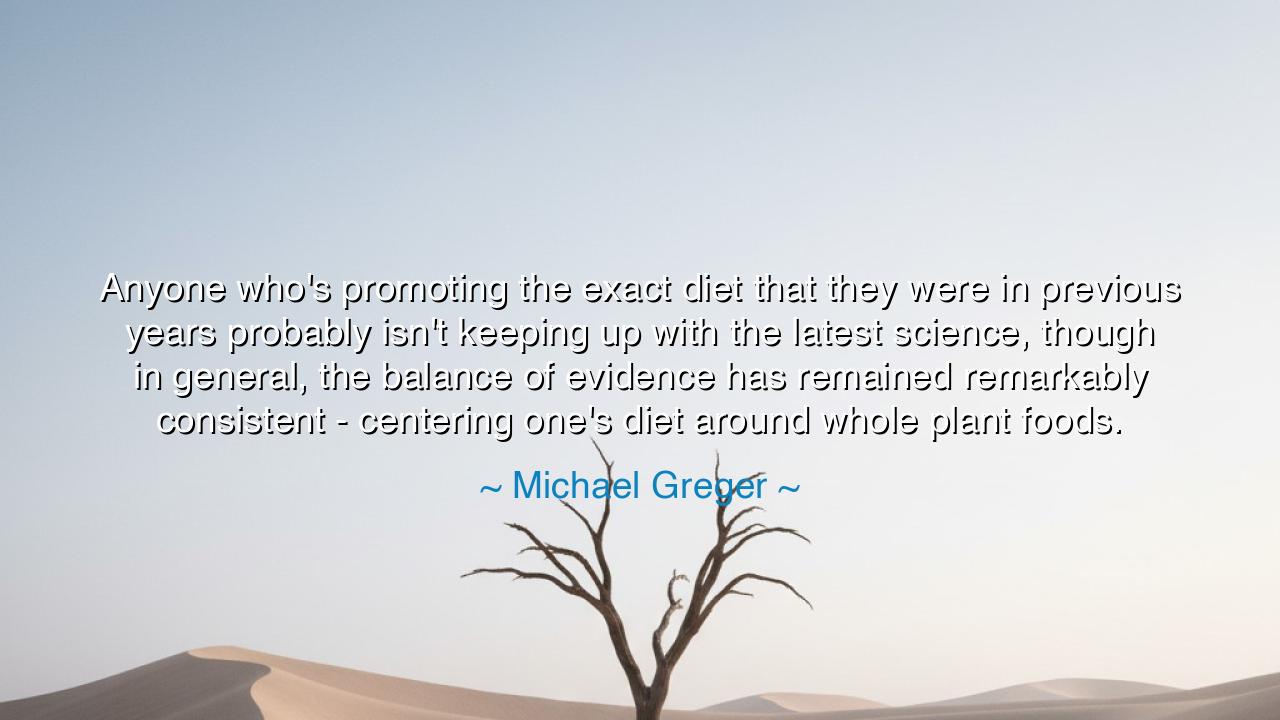
Anyone who's promoting the exact diet that they were in previous
Anyone who's promoting the exact diet that they were in previous years probably isn't keeping up with the latest science, though in general, the balance of evidence has remained remarkably consistent - centering one's diet around whole plant foods.






In the ancient world, where knowledge was passed down through the ages like a sacred flame, there was a profound recognition that true wisdom lies not in rigid adherence to the past, but in the constant evolution of understanding. The words of Michael Greger—"Anyone who's promoting the exact diet that they were in previous years probably isn't keeping up with the latest science, though in general, the balance of evidence has remained remarkably consistent—centering one's diet around whole plant foods"—resonate deeply with the ancient pursuit of knowledge. Greger’s insight speaks not just to dietary choices but to the greater truth that wisdom is dynamic, constantly evolving, and must be grounded in the truths that nature reveals to us over time.
In ancient Greece, the great philosopher Socrates believed that the pursuit of knowledge and truth was a lifelong journey. He famously said, "I know that I am intelligent, because I know that I know nothing." Socrates understood that wisdom does not lie in the absolute, but in the process of seeking and questioning. Much like Greger’s belief in the importance of staying current with new science, Socrates warned against the trap of clinging to outdated ideas, for true wisdom comes from openness and adaptability. The idea that one must remain flexible, allowing the latest discoveries and evidence to shape our understanding, is a lesson that resonates across millennia. Just as Socrates rejected fixed dogmas, Greger calls us to evolve with the growing body of evidence about what is truly best for our health.
The ancient Romans, too, understood that knowledge—and, by extension, health—is not static. Pliny the Elder, the great Roman naturalist, wrote extensively in his Natural History about the ever-changing world of medicine and diet. Pliny was fascinated by the healing properties of plants and herbs, always careful to base his observations on the science of his time. Yet, he also recognized the limitations of knowledge and encouraged a mindset of curiosity and growth. In the same vein, Greger’s call for an evolving understanding of diet, centered on the latest scientific research, mirrors the Roman emphasis on being receptive to new insights. Pliny knew that the world of health was not something to be taken as immutable but should always be open to the light of new evidence.
In ancient India, the great Ayurvedic texts, such as the Charaka Samhita, spoke of health as a dynamic balance, governed by the three doshas—Vata, Pitta, and Kapha. These texts emphasized that diet must align with both the seasons and the individual’s constitution, recognizing that health is not a one-size-fits-all concept. Just as Greger encourages us to remain open to the evolving science of nutrition, the ancient Ayurvedic practitioners understood that the path to health is not static but must change with time, context, and new understanding. The wisdom of Ayurveda is a reflection of the ever-present call to adapt and evolve, acknowledging that even the best practices of today must be challenged by the insights of tomorrow.
The lesson embedded in Greger’s words is one of perpetual growth, adaptability, and an unwavering commitment to the truth—the truth that lies not in tradition alone, but in the evolving body of knowledge that science continues to reveal. The ancients knew well that the pursuit of wisdom is a journey, and just as they adapted their practices based on new discoveries, so must we continue to adapt our own understanding of diet and health. Greger’s call to center one’s diet around whole plant foods is not a static prescription, but an invitation to continually align our practices with the latest knowledge—knowledge that continues to show us the profound benefits of plant-based nourishment.
Let us, then, take this lesson to heart. In the pursuit of health, we must not cling to outdated ideas or rigid practices. We must be open to change, embracing the evolving science that guides us toward better understanding. Greger’s emphasis on the balance of evidence reminds us that while the path to wellness may change with time, there are principles—like the power of whole plant foods—that have withstood the test of time, continually proving their worth. In our own lives, we must adopt a mindset of openness and adaptability, willing to adjust our habits and our beliefs as new knowledge reveals itself.
Thus, as we seek to nourish ourselves in body and spirit, let us remember the ancient wisdom that the pursuit of knowledge is a dynamic and ever-evolving journey. Like the great philosophers, healers, and scientists who came before us, we must embrace the truths of today while remaining open to the discoveries of tomorrow. By centering our diet around whole plant foods—as Greger wisely advises—we are not just following the latest trend, but aligning ourselves with an ancient tradition of wisdom and growth, one that respects both the past and the promise of the future.






AAdministratorAdministrator
Welcome, honored guests. Please leave a comment, we will respond soon